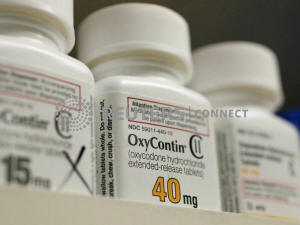|
Family behind Purdue Pharma pushed opioid
marketing, Massachusetts says
 Send a link to a friend
Send a link to a friend
 [January 16, 2019]
By Nate Raymond [January 16, 2019]
By Nate Raymond
BOSTON (Reuters) - Members of the wealthy
Sackler family behind Purdue Pharma LP pushed it to boost sales of
OxyContin and other opioids even as questions emerged about the extent
its painkillers were being abused, Massachusetts' attorney general
alleged on Tuesday.
Attorney General Maura Healey filed an amended lawsuit against Purdue
and current and former officers and directors of the drugmaker that drew
on years of internal records to reveal new details about the family's
involvement in the company.
The lawsuit, originally filed in June in Suffolk County Superior Court,
was the first by a state to try to hold members of the Sackler family,
who own privately-held Purdue, personally responsible for contributing
to the U.S. opioid epidemic.
Purdue in a statement on Tuesday said Healey's lawsuit "distorts
critical facts" and "is littered with biased and inaccurate
characterizations of these documents and individual defendants."

Healey's lawsuit, one of hundreds state and local governments have filed
against the company, accuses it of deceiving doctors and patients by
misrepresenting the risks of addiction and death associated with
prolonged use of prescription opioids.
The allegations were made public despite Purdue's efforts to keep much
of the 279-page complaint redacted.
The complaint cites internal records to argue Sackler family members,
including Purdue's former President Richard Sackler, personally directed
the marketing of opioids in order to make billions of dollars.
They did so even after Purdue and three executives in 2007 pleaded
guilty to federal charges related to the misbranding of OxyContin and
agreed to pay a total of $634.5 million in penalties, the lawsuit said.
[to top of second column]
|

Bottles of prescription painkiller OxyContin made by Purdue Pharma
LP sit on a shelf at a local pharmacy in Provo, Utah, U.S., April
25, 2017. REUTERS/George Frey/File Photo

Their push to boost sales, the lawsuit said, came even after staff
showed family members on Purdue's board a map correlating suspected
illegal prescribers and reports of opioid poisonings in 2011.
Richard Sackler, as Purdue's president, in a 2001 email argued the
company needed to shift responsibility away from Purdue and "hammer
on the abusers in every way possible," the complaint said.
After leaving that position in 2003 but still a member of Purdue's
board, he frequently demanded detailed opioid sales data, the
lawsuit said.
In 2011, Richard Sackler personally accompanied sales
representatives to observe how they marketed Purdue products to
doctors and afterwards argued that a legally required warning about
opioid risks was unnecessary, the lawsuit said.
In an email cited in the complaint, he said, it "implies a danger of
untoward reactions and hazards that simply aren't there" and he
pushed for a "less threatening" way to describe Purdue's opioids.
(Reporting by Nate Raymond in Boston; editing by Alexia Garamfalvi,
Tom Brown and Bill Berkrot)
[© 2019 Thomson Reuters. All rights
reserved.]
Copyright 2019 Reuters. All rights reserved. This material may not be published,
broadcast, rewritten or redistributed.
Thompson Reuters is solely responsible for this content.
 |